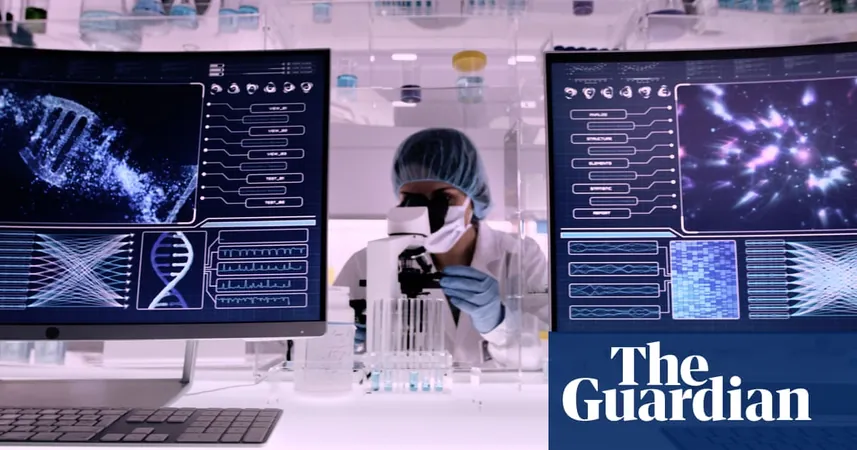
Revolutionary Study of Personalized Cancer Therapies Set to Transform Treatment Landscape!
2024-10-06
Author: Wai
Introduction
In a groundbreaking initiative, scientists have launched a large-scale clinical study focusing on new personalized cancer therapies that offer clinicians a real-time assessment of treatment effectiveness. The ambitious £9 million project, entitled the Manifest project, is a collaborative effort between the prestigious Francis Crick Institute, multiple NHS trusts, charitable organizations, and bioscience companies. Over the next four years, researchers aim to evaluate the efficacy of innovative immunotherapy treatments and pioneer novel cancer detection techniques.
Funding and Research Hubs
This transformative project is part of a broader £118 million initiative backed by the Department for Science, Innovation and Technology. The funding will establish five new research hubs across the UK, dedicated to advancing health technologies—think cheaper scanners, AI-driven cancer diagnoses, and accelerated drug testing through micro-dosing.
Objective and Impact
The Manifest project plans to analyze tumors and blood samples from 3,000 cancer patients, seeking to identify key biomarkers such as genes, proteins, and molecules that could reveal undiagnosed cancers or predict disease recurrence. The potential impact is striking; effective identification of these biomarkers could significantly enhance the success of the new wave of immunotherapy treatments.
Immunotherapy Progress
Immunotherapy has emerged as a promising alternative to traditional cancer treatments, which often involve the harsh 'cut, burn, poison' methods of surgery, radiotherapy, and chemotherapy. Immunotherapy works by harnessing and boosting a patient’s own immune system to target and destroy cancer cells. Prof. Samra Turajlic, a leading clinical researcher at the Crick Institute, has witnessed a transformation in melanoma treatment over her nearly 20-year career. “When I started, patients with advanced melanoma rarely survived beyond six months,” she recounted. “Today, over 50% of these patients survive for at least a decade with the help of immunotherapy.”
Challenges in Treatment
Despite this progress, Prof. Turajlic emphasizes a significant challenge: “We still don’t know which patients will respond positively or experience adverse side effects from these therapies.” Currently, immunotherapies have only shown effectiveness against select cancers. The Manifest project targets four specific types: melanoma, kidney cancer, bladder cancer, and triple-negative breast cancer.
Research Gaps and Goals
The study addresses a critical gap in existing research, which often relies on small sample sizes that fail to provide clear guidance for personalized treatment plans. By focusing on biomarkers, researchers hope to answer the pivotal question of treatment likelihood. Prof. Turajlic stated, “We believe that no single biomarker will provide a complete answer due to the intricate interactions between cancer and the immune system. Therefore, we’ll compile extensive data from tumor and blood samples, and even the microbiome, to refine our predictive tests.”
Collaboration and Expansion
In addition to the primary study cohort, an additional 3,000 patients will be recruited through collaborations with leading institutions such as the Royal Marsden, Barts Cancer Institute, and Cambridge University Hospitals, among others. Enhanced efforts at the five hubs will support the development of portable imaging tools to aid surgeons in real-time cancer identification and a digital pathology data network for extensive research data sharing.
Government Support and Future Outlook
The Science and Technology Secretary, Peter Kyle, remarked on the significance of these innovations, stating, "Cancer impacts every family in the UK. These incredible advancements have the potential to reshape the treatment dynamics of this devastating disease, offering renewed hope to patients." He affirmed that the initiatives could alleviate NHS pressures, bolster the UK's position in burgeoning industries, and foster economic growth, ultimately benefitting public services and research endeavors.
Conclusion
As this ambitious project unfolds, the future of cancer treatment might just be on the brink of a revolutionary breakthrough. Stay tuned as we keep our eyes on the remarkable developments ahead!




 Brasil (PT)
Brasil (PT)
 Canada (EN)
Canada (EN)
 Chile (ES)
Chile (ES)
 España (ES)
España (ES)
 France (FR)
France (FR)
 Hong Kong (EN)
Hong Kong (EN)
 Italia (IT)
Italia (IT)
 日本 (JA)
日本 (JA)
 Magyarország (HU)
Magyarország (HU)
 Norge (NO)
Norge (NO)
 Polska (PL)
Polska (PL)
 Schweiz (DE)
Schweiz (DE)
 Singapore (EN)
Singapore (EN)
 Sverige (SV)
Sverige (SV)
 Suomi (FI)
Suomi (FI)
 Türkiye (TR)
Türkiye (TR)